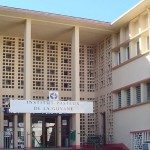Lien vers Pubmed [PMID] – 24867967
Lien vers HAL – Cliquez ici
Lien DOI – 10.1128/AAC.02550-13
Antimicrob Agents Chemother 2014 Aug; 58(8): 4504-14
The usefulness of atovaquone-proguanil (AP) as an antimalarial treatment is compromised by the emergence of atovaquone resistance during therapy. However, the origin of the parasite mitochondrial DNA (mtDNA) mutation conferring atovaquone resistance remains elusive. Here, we report a patient-based stochastic model that tracks the intrahost emergence of mutations in the multicopy mtDNA during the first erythrocytic parasite cycles leading to the malaria febrile episode. The effect of mtDNA copy number, mutation rate, mutation cost, and total parasite load on the mutant parasite load per patient was evaluated. Computer simulations showed that almost any infected patient carried, after four to seven erythrocytic cycles, de novo mutant parasites at low frequency, with varied frequencies of parasites carrying varied numbers of mutant mtDNA copies. A large interpatient variability in the size of this mutant reservoir was found; this variability was due to the different parameters tested but also to the relaxed replication and partitioning of mtDNA copies during mitosis. We also report seven clinical cases in which AP-resistant infections were treated by AP. These provided evidence that parasiticidal drug concentrations against AP-resistant parasites were transiently obtained within days after treatment initiation. Altogether, these results suggest that each patient carries new mtDNA mutant parasites that emerge before treatment but are killed by high starting drug concentrations. However, because the size of this mutant reservoir is highly variable from patient to patient, we propose that some patients fail to eliminate all of the mutant parasites, repeatedly producing de novo AP treatment failures.

